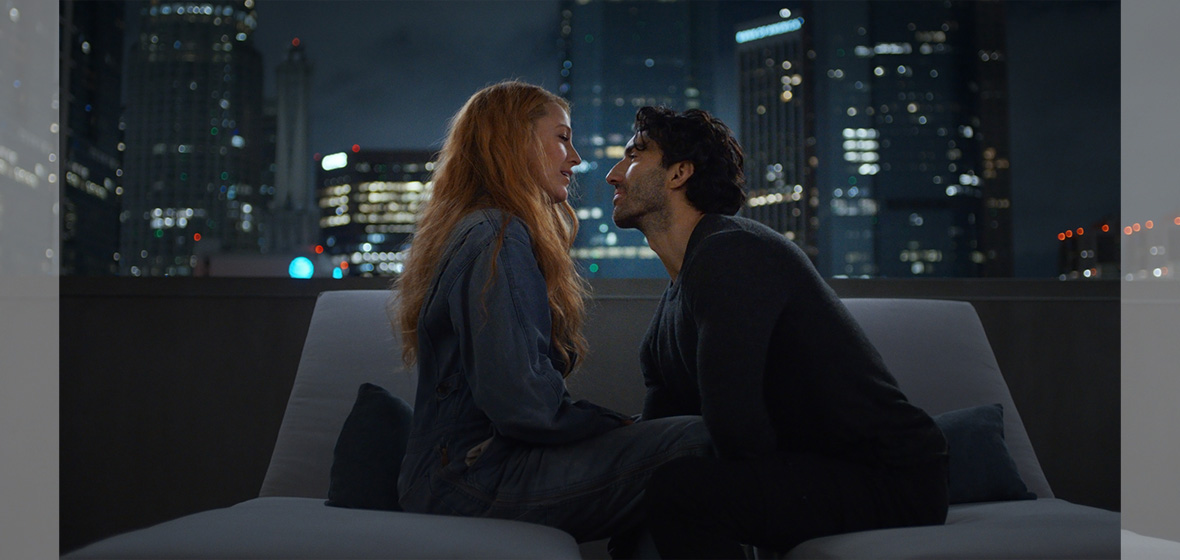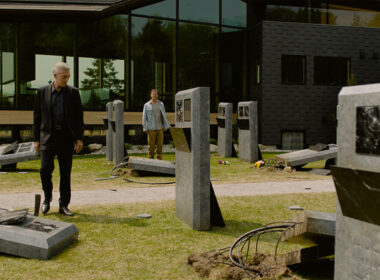It Ends With Us
For such a successful writer, it’s a mystery why it took so long for Colleen Hoover’s books to be adapted to film—and I say film and not specifically “big screen” because I imagine her over-the-top soppy style is fertile ground for the streaming services. Throw this in between episodes of Bridgerton, and you have a dedicated audience.
I am not the target for this kind of film. I have never read a Hoover novel, nor do I intend to. I know of her and can safely assume what to expect of her work from the gaudy flowery cover. Those are not pages for a cynic. And so I expected the film version to be a safe place for in-your-face, heavy-handed emotions; Taylor Swift songs in an upper-middle-class frame. I wasn’t wrong.
It Ends With Us starts with Lily Bloom (Blake Lively) visiting her hometown for her father’s funeral, unearthing her traumatic memories to the point where she cannot even point out five nice things about him in her eulogy. Back in Boston, Lily is opening a flower shop because how could she not with a name like that? It is a detail so ridiculous she almost feels embarrassed by it when she meets Ryle Kincaid (Justin Baldoni, who also directs the film), the gorgeous hunk wealthy neurosurgeon (of course), who is willing to let go of his womanising ways for Lily.
One day, as she’s cleaning the space for her shop, she meets Allysa (Jenny Slate), a wealthy young socialite who is bored enough to enter an empty shop, ask for a job and befriend Lily. She also just happens to be Ryle’s sister.
I got distracted by this character. Does she get paid? Does she have other friends? We only see her around her husband, Marshall (Hasan Minhaj), so I assume she has no other friends? Call me a sceptic, but I sense some red flags here.
Alas, It Ends With Us doesn’t wallow in these irrelevant details. It’s all about Lily and her blossoming relationship with Ryle and how it’s affected by two formative events in her life: her father’s abuse of her mother and her teenage love affair with Atlas (what is going on with the names in this?). The film jumps between the present and flashbacks of a young Lily (here played by Isabela Ferrer) courting a young and homeless Atlas (Alex Neustaedter). For a while, the parallel between the two timelines is there just to give us added context, though it hurts the story’s progression when the banter between adult Lily and Riley is vastly more charming than whatever sappy teen corny sludge the other story is.
But then the inevitable happens. An adult Atlas (played by Brandon Sklenar) appears. This time successful but still doe-eyed, confusing Lily, who obviously hasn’t shaken off her teen love. With the twist comes the creeping sense that Ryle isn’t the perfect man, and Lily could soon be going down the same route as her mother.
So, there are two realities here. The first is a film about dealing with the complexity of the memory of a past relationship in your current self, and here, It Ends With Us offers little. Last year, we had Past Lives, which explored intricately how change and growth affect our perception of memory. How much has Lily changed since the last time she saw Atlas? Did she date anyone else? Did she grow as a person? Did Atlas? All questions It Ends With Us don’t address. Can’t risk cracking that hollow shell of an idea.
The other reality is slightly more complex. It Ends With Us is about domestic violence and how the continuous cycle of violence is generational. This part is treated with a severe heavy-handed that puzzled me. On the one hand, the emotional and traumatic repercussions of domestic violence aren’t explored, but on the other hand, it’s effective at spelling everything out with such a lack of subtlety that everyone who has been in a similar situation would recognise it. It’s hard to watch, but also with the heart in the right place.
This doesn’t make it good precisely, but it speaks directly to its audience. Even the third act plays to a Taylor Swift song, delivering the goods to its people. Until then, I wanted to let It Ends With Us go with a pass. Baldoni cranks up with melodrama to the T, every frame like it could be a cover for the next Hoover novel, and the earnestness of its performances match the style. It’s not offensive, so why should I be bothered by it?
But then you get to the end, and in a final cherry on top, the story resolves the drama repulsively. Part “I can fix him” and part “what would you do if this was your daughter?”, it’s the kind of patronising and harmful rhetoric that lets abusers find peace. Growth isn’t the answer if the abuse stems from power. If that’s how Lily deals with this, it won’t end here.
Verdict: 1.5 out of 5
For the most part, it’s a film that gives its audience what they need—teary, sexy, and emotional catharsis. But that final conclusion throws it all out for a cheap victory. Perhaps fans of the book will love it.




